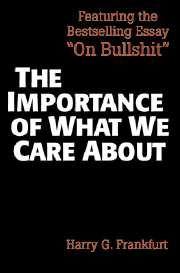Book contents
- Frontmatter
- Contents
- Preface
- Sources
- 1 Alternate possibilities and moral responsibility
- 2 Freedom of the will and the concept of a person
- 3 Coercion and moral responsibility
- 4 Three concepts of free action
- 5 Identification and externality
- 6 The problem of action
- 7 The importance of what we care about
- 8 What we are morally responsible for
- 9 Necessity and desire
- 10 On bullshit
- 11 Equality as a moral ideal
- 12 Identification and wholeheartedness
- 13 Rationality and the unthinkable
9 - Necessity and desire
Published online by Cambridge University Press: 05 June 2012
- Frontmatter
- Contents
- Preface
- Sources
- 1 Alternate possibilities and moral responsibility
- 2 Freedom of the will and the concept of a person
- 3 Coercion and moral responsibility
- 4 Three concepts of free action
- 5 Identification and externality
- 6 The problem of action
- 7 The importance of what we care about
- 8 What we are morally responsible for
- 9 Necessity and desire
- 10 On bullshit
- 11 Equality as a moral ideal
- 12 Identification and wholeheartedness
- 13 Rationality and the unthinkable
Summary
The language of need is used extensively in the representation of our personal and social lives. Its role in political and moral discourse is especially conspicuous and powerful. People commonly attribute needs to themselves and to others in order to support demands, or to establish entitlements, or to influence the ordering of priorities; and we are often inclined to respond to such attributions with a rather special respect and concern. In particular, an assertion that something is needed tends to create an impression of an altogether different quality, and to have a substantially greater moral impact, than an assertion that something is desired. Claims based upon what a person needs frequently have a distinctive poignancy. They are likely to arouse a more compelling sense of obligation, and to be treated with greater urgency, than claims based merely upon what someone wants.
Care must be taken, however, to avoid exaggerating the inherent superiority of claims grounded in needs over claims grounded in desires. It is surely not the case that the moral force of needs is unconditionally greater than that of desires in the sense that every need, without exception, is properly to be accorded unqualified priority over any desire. There are many occasions when it makes perfectly good sense for a person to sacrifice something he needs, even something he needs very badly, for the sake of something he desires but for which he has no need at all.
- Type
- Chapter
- Information
- The Importance of What We Care AboutPhilosophical Essays, pp. 104 - 116Publisher: Cambridge University PressPrint publication year: 1988
- 3
- Cited by



